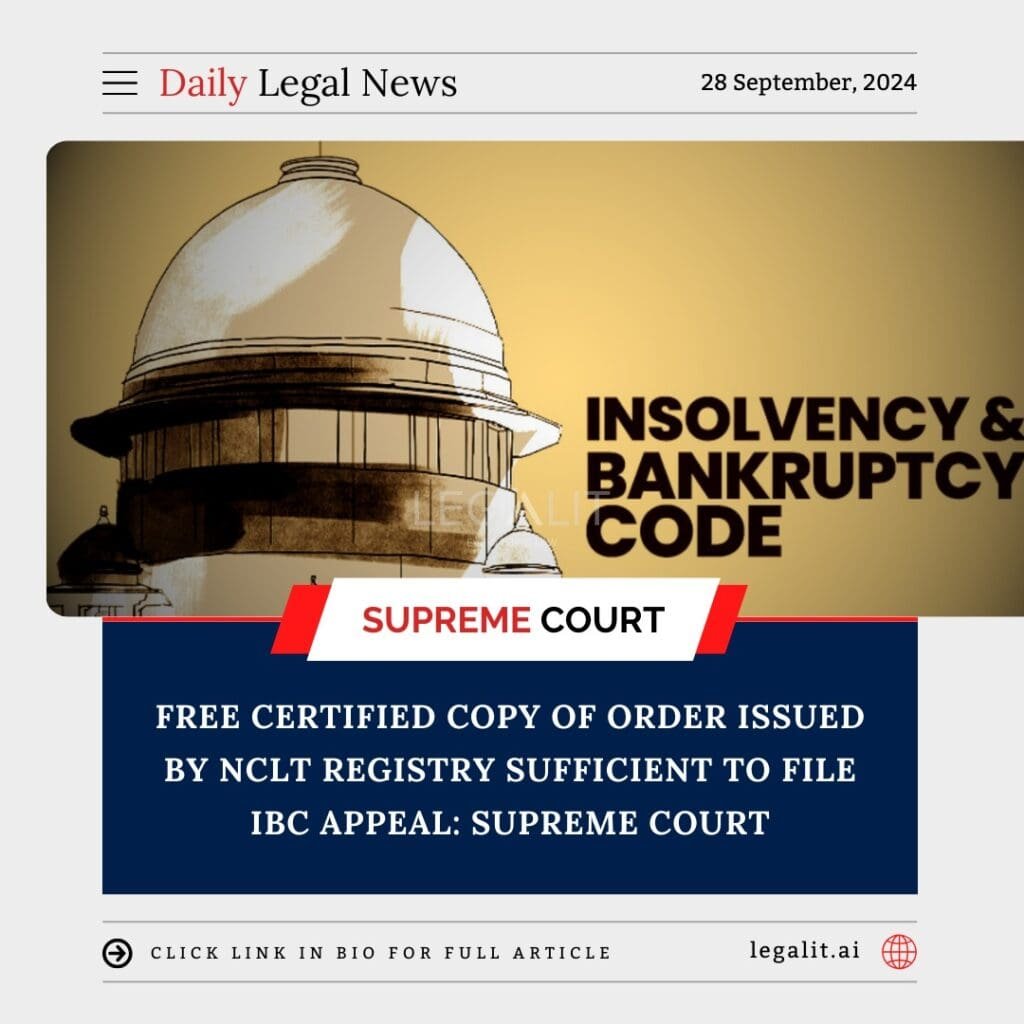
In a significant ruling, the Supreme Court has clarified that a free certified copy of an order issued by the National Company Law Tribunal (NCLT) Registry is sufficient for filing an appeal under the Insolvency and Bankruptcy Code (IBC). This decision streamlines the process for appellants and ensures greater accessibility to justice in insolvency matters.
1. Background of the Case
The issue arose in the context of appeals filed under the IBC, which governs the resolution of insolvency and bankruptcy in India. Traditionally, the requirement for filing an appeal included the necessity of obtaining a certified copy of the NCLT’s order. However, the process of obtaining such copies sometimes involved delays, which could hinder timely appeals and affect the rights of the parties involved.
- Delay in Obtaining Copies: Several appellants faced challenges in securing certified copies due to procedural bottlenecks within the NCLT Registry. Such delays risked dismissals of appeals on technical grounds rather than substantive issues, undermining the principle of timely justice.
2. Supreme Court’s Decision
In light of the challenges faced by appellants, the Supreme Court ruled that a free certified copy of the order issued by the NCLT Registry would suffice for the purpose of filing an appeal under the IBC.
- Legal Clarity: This ruling brings clarity to the legal requirements for appealing NCLT decisions, ensuring that procedural technicalities do not obstruct access to justice. The court emphasized that the intent behind the IBC is to facilitate the timely resolution of insolvency cases, and any procedural hurdles should not impede this objective.
- Judicial Interpretation: The Supreme Court’s interpretation underscores its commitment to making the judicial process more user-friendly, particularly in the realm of insolvency. The court’s decision reflects a progressive approach towards ensuring that legal rights are upheld without being hindered by administrative challenges.
3. Implications for the Legal System
The ruling has far-reaching implications for the insolvency resolution process in India:
- Encouraging Timely Appeals: By allowing the use of a free certified copy, the court has paved the way for quicker appeals, ensuring that parties can seek redressal without unnecessary delays. This is crucial in insolvency cases where time is often of the essence.
- Enhanced Access to Justice: The decision is expected to empower more stakeholders—especially small creditors and businesses—by removing bureaucratic barriers that could prevent them from challenging NCLT orders. This aligns with the broader goal of making the legal system more accessible to all.
- Judicial Efficiency: The ruling may also enhance the efficiency of the judicial system by reducing the backlog of cases that arise from procedural delays. A streamlined process for appeals can facilitate a quicker resolution of insolvency matters, benefiting all parties involved.
4. Conclusion: A Step Towards Inclusivity in Insolvency Proceedings
The Supreme Court’s ruling that a free certified copy of the NCLT order is sufficient for filing an IBC appeal is a welcome development in the Indian legal landscape. It reinforces the principles of accessibility and efficiency within the insolvency framework, ensuring that justice is not only done but seen to be done.
This decision exemplifies the judiciary’s role in safeguarding the rights of individuals and entities engaged in the insolvency process, making it clear that the focus should remain on substantive justice rather than procedural technicalities. As the IBC continues to evolve, such progressive rulings will be essential in fostering a fair and equitable environment for all stakeholders in the insolvency ecosystem.